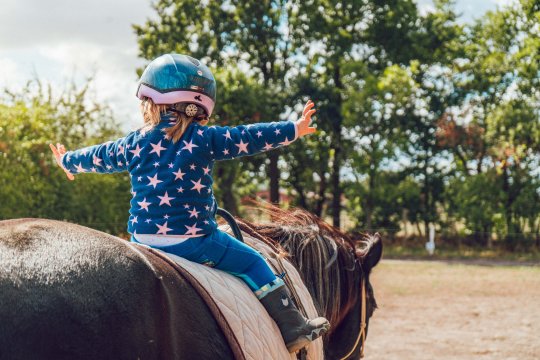What do we need courage for? Well, it helps us overcome fear, discuss difficult matters and deal with situations when something is not working out. It also gives us strength to express and defend one’s own opinion, as well as to be able to bear the consequences of one’s actions. Finally, courage allows us to think outside the box and realise our ideas and dreams.
Cost awareness
An important element of courage is being aware of the costs we incur when acting on it. We should always consider whether in the long run, the consequences of a specific act of courage will be better than succumbing to our fears. Whether it’s better to fight for what’s yours or throw a match.
Your moments of courage
With your child, look at photographs in an album and select those that show when either you or your child has shown courage. This is often considered participation in a performance and your photo coverage of such events is presumably extensive. It could also be a different situation. Talk about how you felt and how you remember it. Let the child describe what it looked like from their perspective. Also, share how you remember this event. If you don’t have photos of a moment like this in your album, try to recollect it. You can start by telling your own story to encourage your child to talk about theirs.
Discuss:
What emotions did you feel at the time? Fear, intimidation, anger?
What helped you muster courage?
What did you feel when you did muster courage? Was it excitement? The sense of power? What would you advise to a classmate, if they were in such a situation, to muster courage?
Use the templates to keep a record of situations in which your children (and you, if you want) have shown courage. It’s very important for strengthening you and your child’s sense of agency and self-esteem. Remember to remind your child that courage is not only big gestures, but also situations when, for example, someone feels insecure, but eventually overcomes their fear and intimidation, because they care about something and find it important. Recall the way you managed in a similar situation. Maybe you turned to someone for help.
We are brave when…:
As a game, complete the unfinished sentences and give examples. Start with several examples and let your child give more. Take turns.
We are brave when…:
We start doing something new that we’ve never done before, e.g. (ask your child to give examples of such situations);
We oppose when someone behaves badly, e.g. (ask your child to finish the sentence);
We refuse when someone urges us to do something that we don’t want to do, e.g. (ask your child to finish the sentence);
We stand up for someone, e.g. (ask the child to finish the sentence).


